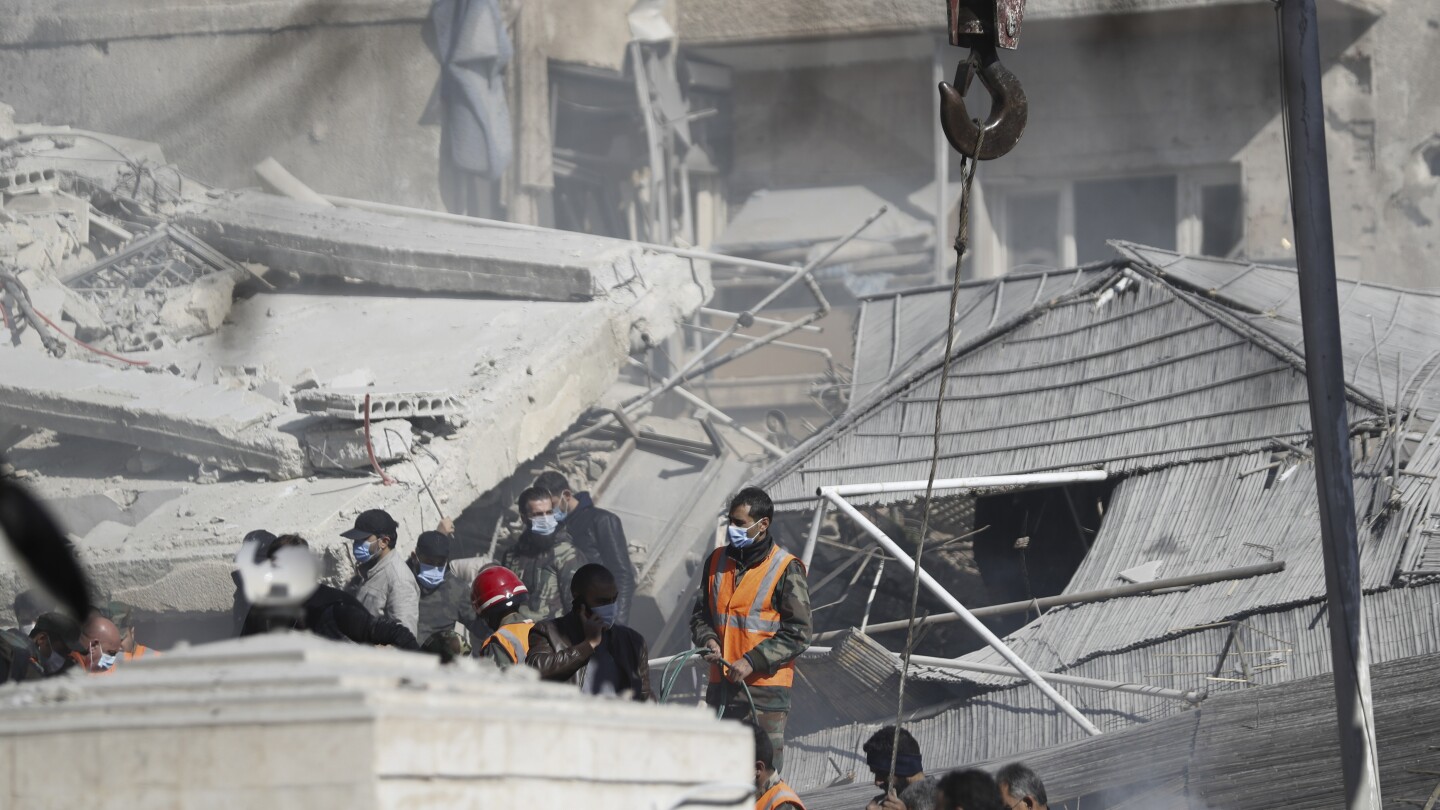DAMASCUS, Syria (AP) — An Israeli strike on the Syrian capital on Saturday destroyed a building used by the Iranian paramilitary Revolutionary Guard, killing at least five Iranians, Syrian and Iranian state media reported.
The Syrian army said the building in the tightly guarded western Damascus neighborhood of Mazzeh was entirely destroyed, adding that the Israeli air force fired the missiles while flying over Syria’s Israeli-occupied Golan Heights. The Israeli military did not comment.
A few hours later, an Israeli drone strike on a car near the southern Lebanese port city of Tyre killed two Hezbollah members who were in the vehicle and two people who were in a nearby orchard, an official with the group and Lebanon’s state news agency said. One of those killed was Ali Hudruj, a local Hezbollah commander, said the official, who spoke on condition of anonymity in line with regulations, without giving further details.
Nour News, which is believed to be close to Iran’s intelligence apparatus, identified two of the dead in Damascus as Gen. Sadegh Omidzadeh, the intelligence deputy of the guard’s expeditionary Quds Force in Syria, and his deputy, who goes by the nom de guerre Hajj Gholam. The guard later issued statements identifying the five dead as Hojjatollah Omidvar, Ali Aghazadeh, Hossein Mohammadi, Saeed Karimi and Mohammad Amin Samadi. It gave no ranks for them. The difference in information could not be immediately reconciled.
An opposition war monitor, the Syrian Observatory for Human Rights, said at least six people — five Iranians and a Syrian — were killed in the missile attack that struck while officials from Iran-backed groups were holding a meeting. The Observatory’s chief, Rami Abdurrahman, said three of the Iranians were commanders, adding that four other people are still missing under the rubble.
Iranian Foreign Ministry spokesman Nasser Kanaani condemned the Israeli strike in a statement saying that “without any doubt, the blood of these high-ranking martyrs will not be wasted.” He added that Tehran “reserves its right to respond to the organized terrorism of the fake Zionist regime at the appropriate time and place.”
Iran also tried again to link Israel to the Islamic State group, something its leaders have been trying to do since a suicide bombing by the extremists in early January in Iran killed more than 90 people.
Security forces deployed around the destroyed four-story building as ambulances and fire engines were seen in the area. A search for people trapped under the rubble was underway. Windows were also shattered in nearby buildings.
A grocer near the scene of the strike said he heard five consecutive explosions at about 10:15 a.m., adding that he later witnessed the bodies of a man and a woman being taken away as well as three wounded people.
“The shop shook. I stayed inside for a few seconds then went out and saw the smoke billowing from behind the mosque,” the man, who asked that his name not be used for security reasons, told The Associated Press.
“What happened was terrifying. I collapsed,” said Khaled Mawed, who lives nearby.
The strike came amid widening tensions in the region as Israel pushes ahead with its offensive in Gaza. Israel’s assault there, one of the deadliest and most destructive military campaigns in recent history, has killed nearly 25,000 Palestinians, according to Gaza health authorities, caused widespread destruction and uprooted over 80% of the territory’s 2.3 million people from their homes.
Israel launched the offensive after an unprecedented cross-border attack into Israel by Hamas on Oct. 7 that killed 1,200 people and took some 250 others hostage. Roughly 130 hostages are believed by Israel to remain in Hamas captivity. The war has stoked tensions across the region, threatening to ignite other conflicts.
Last month, an Israeli airstrike on a suburb of Damascus killed Iranian general Seyed Razi Mousavi, a longtime adviser of the Iranian paramilitary Revolutionary Guard in Syria. Israel has also targeted Palestinian and Lebanese operatives in Syria over the past years.
Iranian and Syrian officials have long acknowledged Iran has advisers and military experts in Syria, but denied there were any ground troops. Thousands of fighters from Iran-backed groups took part in Syria’s conflict that started in March 2011, helping tip the balance of power in favor of President Bashar Assad.
Israel has carried out hundreds of strikes on targets inside government-controlled parts of war-torn Syria in recent years.
Israel rarely acknowledges its actions in Syria, but it has said that it targets bases of Iran-allied militant groups, such as Lebanon’s Hezbollah, which has sent thousands of fighters to support Syrian President Bashar Assad’s forces.
Earlier this month, a strike said to be carried out by Israel killed top Hamas commander Saleh Arouri in Beirut.
Over the past weeks, rockets have been fired from Syria into northern Israel and the Israeli-occupied Golan Heights, adding to tensions along the Lebanon-Israel border and attacks on ships in the Red Sea by Yemen’s Iran-backed Houthi rebels.
____
Mroue reported from Beirut. Associated Press writer Amir Vahdat in Tehran, Iran, contributed.

